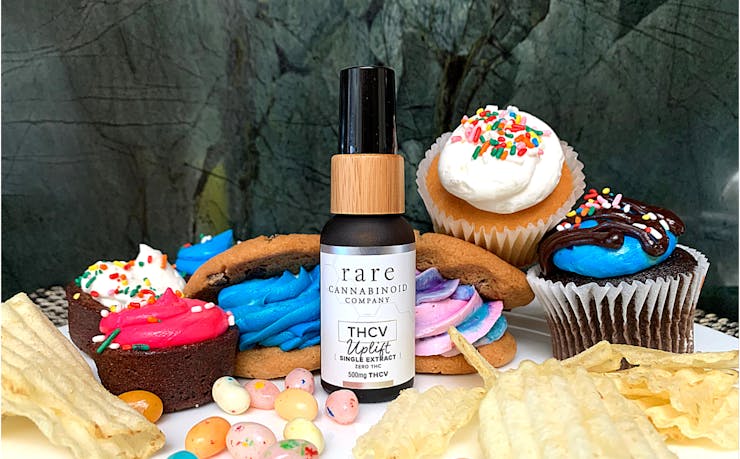THCV has been called “skinny pot” for its alleged appetite-suppressing, stimulating effects. But, does it really work for weight loss? The results of scientific studies are very promising, especially for pure THCV, and THCV combined with CBD.
Read on to explore the latest research and, if you want to try THCV for yourself, Rare Cannabinoid Company has an oil for you. This pioneering brand offers both a pure 500mg THCV tincture and a one-to-one THCV plus CBD blend. Every batch is lab-tested with results published online. You can find full product info below, but first, here’s the skinny on THCV and its potential benefits.
What is THCV?
THCV, short for tetrahydrocannabivarin, is a rare cannabinoid, which means that it naturally exists in extremely small quantities in cannabis and hemp plants. While THC (tetrahydrocannabinol) is known for inducing the munchies, scientists are finding that THCV does the opposite.
“In rodent studies, THCV decreases appetite, increases satiety, and up-regulates energy metabolism, making it a clinically useful remedy for weight loss and management of obesity and type 2 diabetic patients,” according to Biomed Central’s Journal of Cannabis Research.
How does THCV reduce hunger?

Like other cannabinoids, THCV interacts with our endocannabinoid system (ECS). The ECS is a complex cell-signaling system made up of endocannabinoids, receptors, and enzymes which are capable of interacting with its active chemical compounds including cannabinoids, such as THC, CBD, THCV, CBN, or CBG.
Experts are still learning how it works, but the ECS plays a role in regulating much of our mental and physical wellbeing, including appetite, mood and sleep.
The ECS consists of two main types of receptors, CB1 and CB2. THC activates the CB1 receptor which prompts the release of hunger-promoting hormones. THCV does the opposite, blocking the CB1 receptor and decreasing hunger.
The appetite-suppressing effect of blocking the CB1 receptor has been known for some time. However, pharmaceutical drugs designed to block this receptor caused bad side effects. Thankfully, THCV does not! The following studies explain this phenomenon:
Human studies on anti-obesity drug vs. THCV
A pharmaceutical anti-obesity drug, Rimonabant, was approved back in 2006 and worked in the same way as THCV, by blocking the CB1 receptor. It was very effective at reducing weight and blood glucose levels in obese patients. However, it caused depression and was pulled from the market in 2008.
Experiments on human volunteers explain the differences between Rimonabant and THCV.
In two separate studies, magnetic resonance imaging (MRI) was used to examine people’s neural responses while taking Rimonabant or THCV.
The experiment on patients taking Rimonabant found that the drug reduced their response to rewarding stimuli (tasty chocolate) while increasing their negative response to aversive sights and tastes (moldy strawberries). Scientists believe that blocking the “reward” or “pleasure” response to tasty foods was the likely cause of the patients’ depression. It not only made them desire chocolate less but damaged their ability to perceive pleasure, which is known to be a key symptom of major depression.
By contrast, the study on THCV found that it did not impair the volunteers’ reward function. It only upped the aversive stimulus, which stopped people from eating too much, without affecting their mood negatively.
Further studies back up THCV’s potential use as a safer form of appetite control and also show that the rare cannabinoid alters connectivity between regions of the brain in such a way that “THCV could allow greater control over food intake.”
Another related benefit of THCV is its potential to help with diabetes by regulating blood sugar and insulin levels. THCV appears more beneficial for type 2 diabetes, while CBD is useful for type 1. “CBD/THCV combination may be beneficial for different types of diabetes mellitus,” concludes this animal study on THCV for diabetes.
Don’t let THC ruin THCV’s appetite-suppressing effects!
Cannabis flower strains, including Doug’s Varin, Durban Poison, Tangie and Jack the Ripper all contain higher amounts of THCV (between 1 and 5 %). But, these THCV-rich cannabis flowers also contain a lot of THC, which will get you high and probably overwhelm any appetite control offered by the THCV.
This can be seen in an experiment on mice that included three different forms of THCV: a pure plant-derived THCV, a synthetic THCV-style CB1 antagonist, and a THCV-rich cannabis extract. The pure THCV and synthetic CB1 antagonist both suppressed food intake for 6-8 hours after consumption and continuously in mice that were injected for four consecutive days. Both groups of mice lost a significant amount of weight and did not rebound by eating extra the day after their dosage stopped.
However, mice that were given the THCV-rich cannabis extract neither ate less nor lost weight. This was believed to be due to residual amounts of THC in the extract. To counter the THC’s effect, those mice were given CBD (cannabidiol). Amazingly, it worked, and the mice proceeded to feed less and lose weight.
According to the study, it appears that for weight-loss, one needs to take THCV without THC or at least counter it with added CBD.

If you want to try THCV for yourself, Rare Cannabinoid Company is the first brand to offer a pure THCV extract as well as a one-to-one blend of THCV and full-spectrum CBD from rare Hawaiian hemp.
Quantity of THCV is key
It’s also important to look at the exact amounts of THCV in different products. Some full-spectrum oils will claim to be high in a rare cannabinoid but only contain trace amounts of it.
Rare Cannabinoid Company’s THCV single extract has a whopping 500mg THCV. The only other ingredient is organic MCT coconut oil. Each spray contains 6.7mg THCV and there are 75 sprays per bottle. Milligrams are clearly listed on the packaging and third-party lab reports are available online.

The brand’s “Ready Blend” option contains 250mg THCV and 250mg CBD. Rare Cannabinoid Company’s full-spectrum CBD is extracted from hemp sun-grown in mineral-rich red dirt in Hawaii. Their THCV blend also contains organic MCT coconut oil and is lightly flavored with food-grade organic Italian lemon and wild orange oils.
Apothecary-style approach to cannabinoids
This pioneering brand was created by the founders of Hawaii’s most-popular CBD brand, Hawaiian Choice, to offer an apothecary-style approach to mixing and matching cannabinoids for a personalized wellness experience. For example, CBN may be beneficial for sleep,CBG for combating inflammation and bacteria, and CBC for mood and healthy skin.

Rare Cannabinoid Company’s “Apothecary” line also offers 500mg single extracts of CBN, CBG, and CBC as well as an extra high strength 3000mg CBD (which comes with a glass dropper for precision dosing instead of a spray cap.) The Hawaiian brand recommends that the purified extracts be taken alongside their 500mg or 1000mg full spectrum Hawaiian CBD oil to receive all the benefits of the entourage effect.
For anyone interested in combining rare cannabinoids with a broad spectrum oil instead of full-spectrum, all Hawaiian Choice products contain Hawaiian CBD with THC filtered to below lab detectable levels (instead of below 0.3%).
Hawaiian Choice’s Active CBD Oil pairs perfectly with Rare Cannabinoid Company’s THCV as it contains three unique terpenes to boost energy and assist with exercise and appetite control. It also tastes amazing thanks to infusions of organic and wild gathered Hawaiian pineapple, passion fruit, noni, hibiscus, and organic Big Island honey.
For those who don’t want to mix and match, Rare Cannabinoid Company’s “Ready Blends” offer one-to-one mixes of CBN, CBG, and CBC, each with full-spectrum Hawaiian CBD. These blends are ideal for people who want an off-the-shelf complete hemp supplement with the added benefits of high levels of rare cannabinoids.
Looking for other benefits of THCV?
Amazingly, every cannabinoid is believed to offer many different specific health and wellness benefits, both mental and physical. In addition to the potential appetite-suppressing effects of THCV, scientific studies have shown the following results:
- THCV may decrease drug abuse and addiction. In this study, it was found to reduce nicotine-dependence in mice and rats.
- Studies have shown THCV may decrease inflammation and inflammatory pain.
- THCV has anti-psychotic effects. “THCV has therapeutic potential for ameliorating some of the negative, cognitive and positive symptoms of schizophrenia,” one study concluded.
- THCV and Parkinson’s Disease. “THCV shows promise both for the treatment of disease progression in PD and for the relief of PD symptoms.”
- THCV shows promise in reducing or preventing seizures,
You can learn more about rare cannabinoids and purchase them at rarecannabinoidco.com






